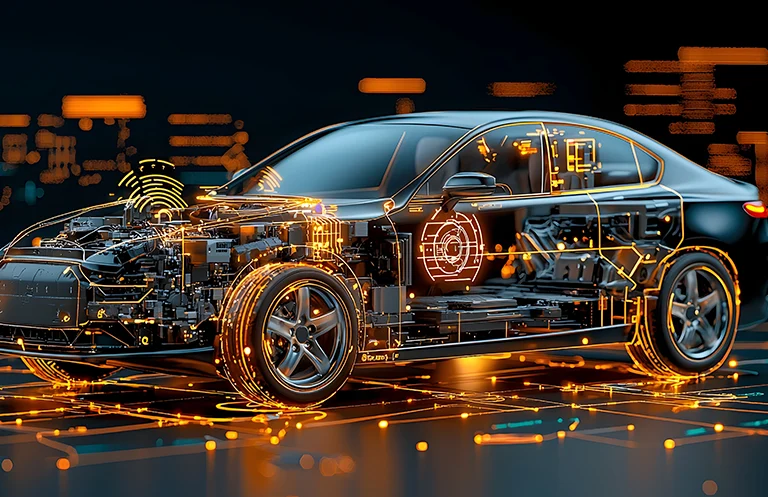Statements like “Data is the new fuel” and “Sometime back AI only existed in science fiction” are no longer relevant. Today technologies like AI, ML, Big Data, etc. have permeated into every area of our lives. Technology is growing faster than we ever imagined.
Just take the automotive industry for example, from being a mechanical machine that took you from point A to point B, has now involved into intelligent machines that move on their own with the help of various electronic components that give them a brain of their own. All this is made possible due to technologies such as AI, ML, Big Data, IoT, and other connected solutions.
According to a McKinsey estimate a connected car generates around 25 GB of data every hour. Utilizing this data effectively can change the landscape of the auto industry. Data can play a major role in making effective business decisions and enabling better driving experience and improving safety.
Collecting and Processing Big Data
There are many sources for data gathering, such as GPS, sensors, cameras, ECUs, that help in collecting data from vehicles. These real-time data insights are captured from these sources, and then extracted and combined to provide necessary services or improve the vehicles in the future.
All these components generate structured, unstructured, and semi-structured data (just 5-10 percent of the entire data). Multiple tools can be used to process and analyze the data received from these sources. Tools like Apache Hadoop, Tableau, Splunk, Zoho Analytics, and others are used extensively for analyzing and processing the data.
How will it help the Automotive Industry?
For automotive manufacturers, data can play a major role in making effective business decisions. Automotive companies like Hyundai have been investing in Big Data since 2012 and they are also considered one of the pioneers who realized its potential and adopted it before anyone else could capitalize on it.
According to Junghee Lee of Hyundai, “Through the Big Data analysis, we use optimization methodology to maximize the effectiveness of the utilization of our resources. For example, we could increase the error recognition rate through a deep learning algorithm or decrease the logistics cost through logistics optimization analysis. There are many ways to utilize Big Data.”
Pushing timely OTA updates: Big Data can be leveraged in different areas of automotive. One of the important aspects is using Big Data in manufacturing to reduce errors and produce better quality vehicles. For connected cars, it enables them to deliver adequate connectivity services and over-the-air (OTA) software and firmware upgrades as they are ready to be pushed, to improve the driving experience. Any new functionality can be introduced, and its performance can be tracked in real-time and the function can be improved based on the data collected.
Maintaining the vehicle: Machine Learning models fetch sensor data from the vehicle to track the critical components like brakes, battery, and engine. This data can be collected and then sent to the company to understand the wear and tear in the components and ensuring timely service is provided. This will help in avoiding any mishaps and reduce the chance of breakdowns. If we can figure out via Big Data analysis when the vehicle needs to be checked, we could apply these pieces of data to train our ML models. This technology will help in avoiding malfunctions and improve the driving experience.
Avoiding accidents & Improved Security: Big Data can also play a key role in avoiding accidents. When a vehicle slips off the road or spins out of control due to various circumstances like snow, fog, or pothole, or others, it can detect the possible dangers via the sensors and send alerts to the vehicles behind. However, for implementing such functionalities you need to have strong training data that will enable the learning model to be effective.
The security of the vehicle is another area where big data analysis can contribute. For example, Hyundai has a mobile application called BlueLink, which helps the driver to track where the vehicle is located and turn off the engine in case the vehicle is stolen. While tesla has multiple cameras and authentication functions that allow only authorized users to access the car.
When it comes to fully develop autonomous vehicles, big data will play a large role in making it a success. In the future, we will see entire physical spaces being interconnected and interacting with each other, like homes, offices, cars, etc. will be interconnected and data continuing to play a strong role in enabling a connected future. A lot will depend on how the key stakeholders (car manufacturers and others) utilize the data and put it to optimal use.
eInfochips is a product engineering company with over two decades of experience and expertise in technologies like AI, ML, Big Data, IoT, digital transformation, and enabling digital technologies for many automotive OEMs. To know more about our capabilities, get in touch with us.












